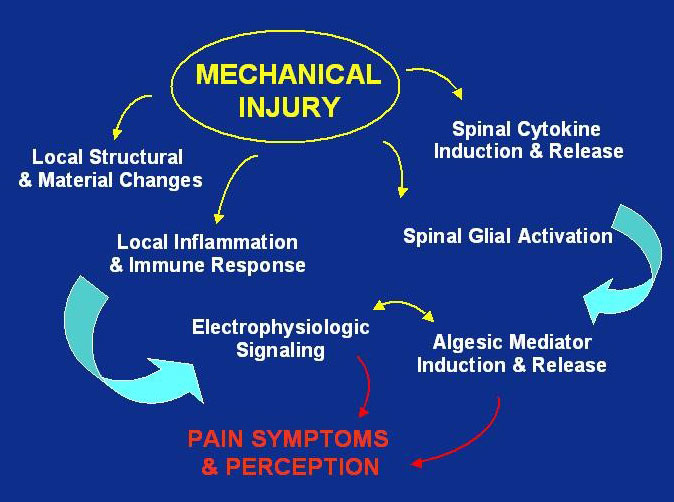Radicular Pain
Radicular pain is caused by irritation of the nerve roots and is usually more severe than referred pain and may have a more distal radiation (involving the hands or foot). Radicular pain usually circumscribes the territory of innervation of the given nerve root. The pain is often deep and steady and can usually be reproduced with certain activities and positions, such as sitting or walking. In addition, radicular pain is frequently exacerbated by any manoeuvre that raises the pressure of cerebrospinal fluid (or the intrabdominal pressure), such as Valsalva, sneezing, or cough. This orthopaedic examination will be carried out by the Chiropractor is radiculopathy is suspected.
Radicular pain radiates into the extremity (thigh, calf, and occasionally the foot or to the arm, forearm or hand) directly along the course of a specific spinal nerve root. The most common symptom of radicular pain is sciatica (pain that radiates along the sciatic nerve – down the back of the thigh and calf into the foot) and arm pain and paraesthesia of the hand.
Possible and common causes of radiculopathy, in their order of prevalence, include:
- Herniated disc with nerve compression – by far the most common cause of radiculopathy
- Foraminal stenosis (narrowing of the hole through which the spinal nerve exits due
to bone spurs or arthritis) – more common in elderly adults - Diabetes
- Nerve root injuries (Whiplash injuries)
- Scar tissue from previous spinal surgery that is affecting the nerve root
- Herpes Simplex Virus Type I Infection

Resource: University of Pennsylvania for access to this slide; extracted from http://www.chiro.org
Can Chiropractic help with your radicular pain?
As radicular pain can cause severe discomfort and disabilities, it is advised not to ignore the symptoms and seek help as soon as possible. Chiropractors are highly trained to diagnose, treat, and manage this problem effectively and conservatively without surgical procedure. However, if nerve root irritation is too advanced and has numerous complications, you might be referred to an orthopaedic doctor. Therefore, it is encouraged to seek for natural and conservative treatment when nerve roots are not severely affected and/or damaged.
Numerous studies have shown great effectiveness in the treatment of radicular pain with Chiropractic Spinal Manipulation. Conservation treatment methods like spinal manipulation to improve joint motion restrictions, and spinal traction have been well documented to improve patient’s radicular pain.
- Chiropractic treatment of cervical radiculopathy caused by a herniated cervical disc. https://www.ncbi.nlm.nih.gov/pubmed/8169540
- Manipulation or Microdiskectomy for Sciatica? A Prospective Randomized Clinical Study J Manipulative Physiol Ther. 2010 (Oct); 33 (8):576–584
Schedule a 1-on-1
Consultation Today
Address: Block 231 Bain Street, #04-49 Singapore 180231.
Mobile: +65 9854 6806
